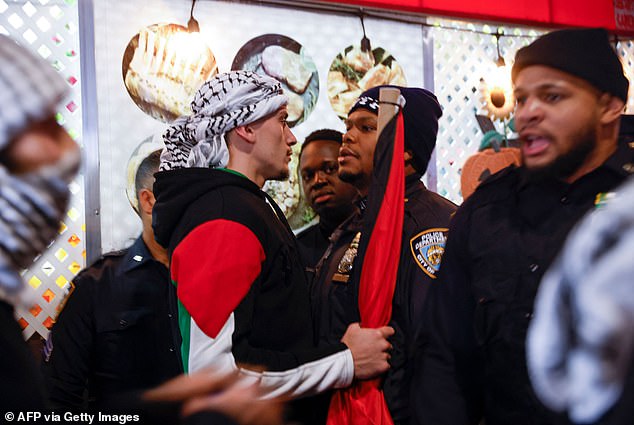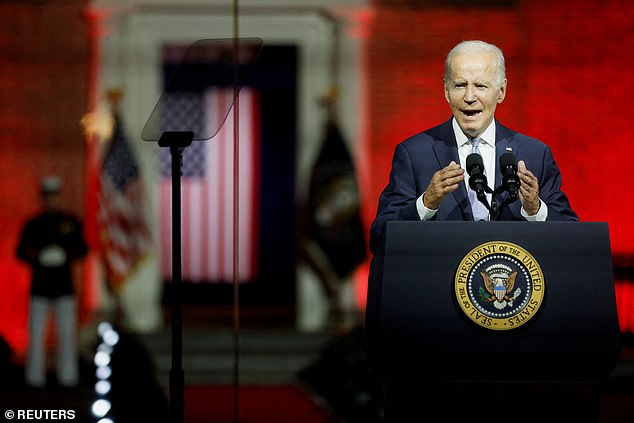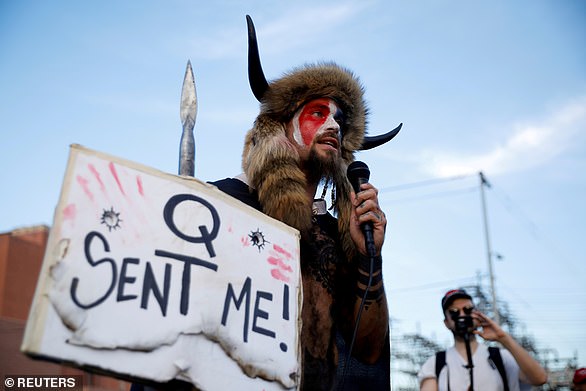A quarter of voters say America is so off track that patriots may have to use violence to “save” the country, polls show, while millions embrace QAnon and fear democracy will die in the elections from 2024
Nearly a quarter of Americans now say the country has gone so far off the rails that patriots may have to resort to violence to save it, an alarming new survey shows.
Polling from the Public Religion Research Institute (PRRI) also shows that millions more Americans have embraced the ideas of QAnon, and voters overwhelmingly believe next year’s elections could spell the end of democracy .
The questionnaire comes as the country heads toward a divisive 2024 presidential election that appears likely to pit incumbent Democratic President Joe Biden against his predecessor, Donald Trump, a Republican.
The last time these two faced off in the 2020 election, Trump refused to accept defeat and his supporters stormed the US Capitol on January 6, 2021, in an attempt to stop the certification of Biden’s victory.
Polls from the Public Religion Research Institute (PRRI) sound the alarm about America’s divisive politics

Protesters clash with police officers as people gather in support of Palestinians in Brooklyn, New York, the latest flashpoint exposing the fissures in American society
PRRI President Robert Jones said the polls show the “political temperature in America is rising even further.”
“Our last presidential election was the first in our history without a peaceful transition of power,” Jones said.
“We should be deeply concerned about the growing number of Americans who express openness to political violence.”
The national survey of 2,525 adults showed that the number of people who tolerate political violence has increased dramatically in the past two years.
As of early 2021, only 15 percent of Americans agreed with the statement that “because things have gone so far off course, true American patriots may have to resort to violence to save our country.”
That was about the same time as the January 6 uprising.
This year, 23 percent agreed — with increases among both Republicans and Democrats.
White evangelical Protestants and people who believe Trump won the 2020 election are more likely to support violence than others, researchers said.

Donald Trump’s mugshot. The former president has used increasingly fierce rhetoric against his political enemies ahead of next year’s elections

President Joe Biden called MAGA “extremists” a threat to democracy itself in a prime time speech
Trump, the front-runner for the Republican presidential nominee, has used increasingly violent rhetoric in a reelection campaign clouded by his criminal charges in four jurisdictions.
He has derided the political “witch hunt” to prevent his return to office, called for harsh treatment of migrants and criminals, and even called for the execution of a former top military official.
At the same time, more and more Americans have embraced the QAnon conspiracy theory.
The crazy creed depicts a devil-worshipping pedophile elite secretly pulling the strings of American and global institutions.
The number of adherents has increased from 14 percent in 2021 to 23 percent today, says PRRI, a nonprofit organization.

Atlanta officials inspect damage from anti-police activists who vandalized a site in Atlanta, Georgia

A man gives a Nazi salute as two neo-Nazi groups, Blood Tribe and Goyim Defense League, held a rally in Orlando, Florida in September 2023
Republican voters are more likely to adhere to QAnon beliefs, but many Democrats also support this theory.
Against this backdrop, an overwhelming majority of 75 percent of Americans are concerned that the future of American democracy is at stake in the 2024 presidential election.
About 84 percent of Democrats are concerned about the loosening of representative government, but so are 77 percent of Republicans.
More broadly, the research sheds light on the racial, religious and political divides that influence America’s increasingly fractious politics.
It paints a portrait of a nation facing major demographic shifts as Americans turn away from mainstream media and misinformation swirls on social media.

